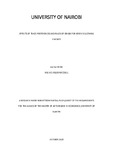Effects of Trade Preferences and Rules of Origin for Kenyas Clothing Exports
| dc.contributor.author | Mutui, Peter | |
| dc.date.accessioned | 2016-04-28T12:15:39Z | |
| dc.date.available | 2016-04-28T12:15:39Z | |
| dc.date.issued | 2015 | |
| dc.identifier.uri | http://hdl.handle.net/11295/95257 | |
| dc.description.abstract | This study examined the effects of trade preferences and rules of origin for Kenya’s clothing exports to the United States (US) and European Union (EU). The study used the gravity trade model framework and time series data depicting clothing exports from Kenya to the US and EU from 1991 to 2013. Trend analysis portrayed an upward pattern of clothing exports destined to the US market while the exports to the EU market had been declining. This was also true with statistical results which indicated that both AGOA and Cotonou Agreement had statistically significant effects on clothing exports from Kenya. Results of the models indicated that the US-AGOA preferences had a positive influence on the growth of clothing exports. On the contrary, Cotonou Agreement had a negative influence on clothing exports and indeed they actually declined a possibility that EU’s rules of origin were more stringent when compared to the US. | en_US |
| dc.language.iso | en | en_US |
| dc.publisher | University of Nairobi | en_US |
| dc.title | Effects of Trade Preferences and Rules of Origin for Kenyas Clothing Exports | en_US |
| dc.type | Thesis | en_US |

